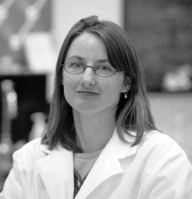By Dan Bodene, contributing writer
 |
| OU professor Linda Schweitzer is an expert on water pollution. |
Taking a drink of water shouldn’t be worrisome. In fact, most people take it for granted that their water will be clean and safe. And Oakland University is helping to make sure it stays that way.
Programs at OU are attracting people who work in industries centered around water, said Linda Schweitzer, Ph.D., and associate professor of environmental chemistry.
For example, OU offers master’s-level studies in water chemistry that have been noticed by organizations ranging from bottled-water companies to public health non-profit organizations.
“Several water technology companies are sending their employees to Oakland for training,” Schweitzer said. “Two of our students recently got jobs working on water programs at a company in Ann Arbor. We’re also consulting with water districts on the right chemicals to use in the treatment processes, and how to optimize those processes.”
Water has long been Schweitzer’s focus and passion. She’s known as an authority: Schweitzer was interviewed for an Oakland Press story in May on the potential environmental impact of the Deepwater Horizon oil spill in the Gulf of Mexico.
She also was part of a team that worked on treatment processes to remove pharmaceutical residues from water. The work has resulted in several research papers, one of which already has been published.
For many years, she has worked with students in studying chemical contaminants in lakes and rivers in Michigan. Typically, she said, chemicals deposited on land long ago eventually leach into groundwater, and then migrate into lake and stream beds. Students now are trying to identify the sources of those “legacy contaminants.”
“At OU, we’ve been training students on identifying and remediating pollution for a long time,” Schweitzer said. “There has been an environmental health program here for decades.”
What’s new is the development of an interdisciplinary major in environmental health and occupational health and safety. It combines emphasis on public and environmental health taught in the Department of Chemistry, with workplace health and safety within the School of Health Sciences.
“Our fastest-growing programs are about resource management,” Schweitzer said. “Sustainability and conservation of resources like water, soil and energy. And, we’ll always need experts in water quality.”
Michigan natives often take water for granted. After all, many people live within walking distance of a stream, river, pond or lake. “In Michigan, we can’t imagine a lack of quantity,” Schweitzer said. “But we have to look at ways to preserve it and, perhaps, to share it.”
Michigan’s abundance of water isn’t typical, however. One third of the world’s population does not have access to clean water, and in some rural areas, people must walk an average of four miles to get any water at all.
“Water is so central to life, we’ll always have water issues,” Schweitzer said. “But Michigan is the exception when it comes to access to fresh water. Who knows, Michigan may become the Saudi Arabia of the water world.”
For more information about OU's Environmental Health and Safety program,
view the website.

